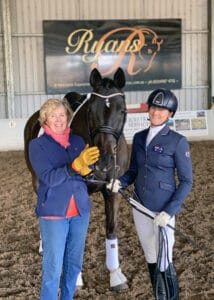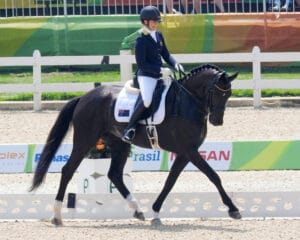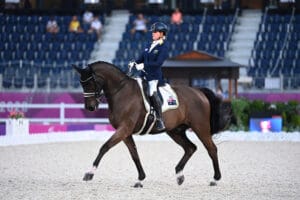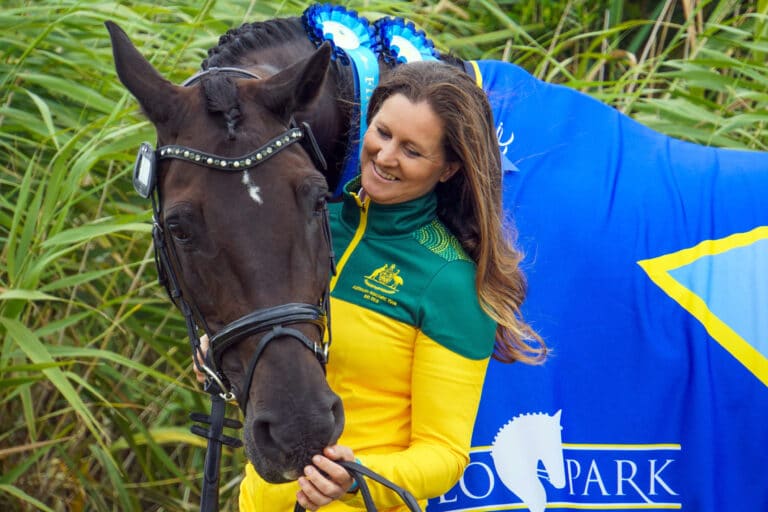Three-time Paralympian Sharon Jarvis’ fighting spirit has helped her overcome many challenges throughout her career. She talks to ENYA CROCKFORD about her battles and triumphs.
Having a go-to philosophy is an advantage, and Sharon Jarvis’s is inspiring: “It’s how you carry yourself through the hard times that will keep you going for the good times,” she says.
Sharon’s start to riding in country WA was a far cry from the prestige of an international arena. Obsessed with horses, she was forever trying to climb up the legs of her older siblings’ ponies so she could ride. Eventually her parents yielded to her nagging and bought her a pony when she was five. “I’m not sure how we survived,” she laughs. “We had the wrong horse, the wrong gear, and we used the cattle crate on the back of the farm truck to get to Pony Club. But they were such fun times for us as a family.”
Two years later, Sharon’s life changed dramatically when she was diagnosed with Ewings Sarcoma, a relatively rare bone cancer. Her leg was to be amputated and she was given only a twenty per cent chance of survival. Fortunately, her doctor conferred with a top specialist in the United States, and her leg, although it lost much of its function, was saved.
However, weakened by radiotherapy, she broke the same leg a year later, causing numerous complications – not the least of which was that to protect her leg from further fracture, she wasn’t allowed to ride. “My parents sold my pony and tried to get me to do other sports to take my mind off horses. But I never, ever, gave up hope that I would one day ride,” Sharon says. “I asked the doctor at every visit, and eventually he said, ‘You’re so persistent, I just can’t keep saying no’. I’ll forever remember the day I got back on a horse as being one of the happiest of my life.”
But being back in the saddle came with its share of challenges. “I hadn’t realised how fearful I’d be about falling off and breaking my leg again. So I decided that the better I learned to ride, the less chance I had of falling off,” Sharon tells me. “I just wanted to be the best I could be. My coaches taught me to ride as an able bodied person – making the most of what I had. It didn’t matter that one leg was weaker than the other and my hips weren’t straight. I learned how to sit as straight as I could and make the horse go as correctly as possible.”
Pony Club also provided invaluable support to Sharon during her teenage years. “School wasn’t a pleasant time for me, but in Pony Club I found my people. I was surrounded by some amazing friends who were so caring and giving, and helped to forge me into the rider and person I am today.”
In 2006 Sharon was competing up to Medium dressage, with the Paralympics the furthest thing from her mind. “I had dreamt of representing Australia, but I was just this kid from the country with a crazy idea.” Not so crazy as it turned out.
Sharon was approached by paraplegic equestrian Mary Ipkendanz, who asked whether she had considered the Paralympics. “It was a shock as I’d never thought of myself as having a disability. But then I was very excited, realising I had an incredible opportunity to compete in the sport I love while representing the country I love.”
Sharon describes her decision to chase her dream as “the beginning of the whirlwind.” By the following year she was in the UK with a borrowed horse, competing at the first ever World Para Dressage Championships. Not only did she achieve two top 10 placings, she also found Applewood Odorado, who would become her horse for Beijing.
Sharon and ‘Odie’ only had six weeks to get acquainted before the first selection event. “I look back and think I had no idea what I was doing, but we placed 4th, 5th and 7th at Beijing. It still blows my mind what we managed to pull off,” she laughs.

Sharon with Rozzie Ryan and Romanos at Ryans Equestrian Centre (Image courtesy Sharon Jarvis).
At the 2010 World Equestrian Games (WEG), they improved on their impressive Beijing result with bronze medals in both the Individual and Freestyle competitions. That accomplishment was made bittersweet by the sudden passing of Sharon’s father: “He had been my biggest supporter and taught me to work hard and follow my passion. It was a pretty rough road to the Games and made those bronze medals even more special.”
The following years threw plenty of obstacles in Sharon’s path, but she drew on the determination and resilience she’d began building earlier in life. Horse injuries forced her to withdraw from contention for both the London Olympics and WEG 2014. “The sport is such a rollercoaster of absolute highs and devastating lows. The withdrawal from London was crushing,” she tells me, “but my horse had given me everything and I owed it to him to do the right thing by him. You have a cry, you pick yourself up, and you go again.”
All equestrians know the financial challenges of staying competitive, but for para-equestrians it’s especially difficult. “We don’t attract owners the same way able bodied riders do, so it’s difficult to keep longevity in our sport,” Sharon explains.
Fortunately, in 2014 Equestrian Australia approached her about the Winning Edge program, and a syndicate was created enabling her to purchase Ceasy, her talented but quirky KWPN mare.

Sharon and Ceasy achieved a Grade Four ninth place at the Rio Paralympics (Image by A & H Photography).
But more challenges were to come. Several months after Ceasy’s arrival Sharon fractured her leg once again and it refused to heal, meaning she needed surgery just six weeks before the first Rio Paralympic selection trial. When her doctors told her there was no guarantee she would ever get back on a horse, in her typical determined style she said: “That’s fine. I don’t do ‘if’, I do ‘when’.”
Following her surgery, a friend drove Ceasy to New South Wales so Rozzie Ryan, Sharon’s coach, could ride and train the mare. Sharon managed a five-minute ride at the end of each training session before going straight into the selection competition. After six trips across the Nullarbor during the selection process, Sharon was relived to make it to Rio. “It was a pretty crazy time but we made it happen,” she says, in what sounds like a major understatement.
In 2017 Sharon decided to base herself with Rozzie full time. “The motivation is amazing. Riders are there because they want to be the best they can be, and you have so many performance horses going through every day. I thrive in that environment,” she says.
At the time she was campaigning her stallion Lord Lamarch, owned by Jade and Chris Edwards and Alan Moody, towards Tokyo. Unfortunately he sustained an injury in 2019 and Sharon once again found herself horseless. “After uprooting everything and working such long hours, I felt exhausted. I didn’t have the finances, and just needed to head home,” Sharon recalls.
This time it was Rozzie who stepped in and refused to let her give up, suggesting she should put the word out on Facebook to see if anyone could loan her a horse for Tokyo. To Sharon’s amazement she was flooded with offers, and found her unicorn in Romanos, a 19-year-old gelding from Queensland. “He’s a great character, he just tried so hard,” she enthuses. “We had to get to know each other, and he had to learn to listen to my whips, but he really stepped up to the plate.”
Sharon made history at Tokyo as the first Para-equestrian rider to compete in three Paralympic Games. She and Romanos came 10th in the individual competition and were part of the Australian team that placed 13th.

With brown unicorn Romanos, Sharon made history in Tokyo as the first Australian Para-equestrian rider to compete in three Paralympic Games (Image by Jon Stroud).
After the stress of campaigning, Sharon had told herself Tokyo would be her last games, but a less than ideal homecoming changed her mind. Six weeks after returning to Australia she underwent yet more surgery, followed by an emergency surgery ten days later. “I think the universe was reminding me I love my sport, I love representing my country, and not to give up that opportunity just yet. I’d missed out on that Paralympic medal, but we’d now discovered a lot of things that were going on with my body, and I think it will make it easier to ride better,” she says. “At the end of the day I love inspiring people to follow their dreams, and I think I do that best when I sit on a horse.”



